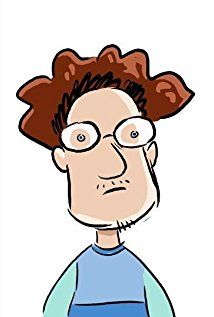Mating
Exclusive Interview with Director Dominic Polcino
We discuss the Louis C.K. scandal, #MeToo, & need for unique voices in Hollywood
Posted February 28, 2018
Dominic Polcino has worked as a director on some of the most famous animated television shows of all time, including The Simpsons, The Family Guy, King of the Hill, and Rick and Morty. Dominic Polcino’s most recent project, Lovesick Fool, is an award-winning animated short that follows the main character—Donnie Palamini—as he navigates the modern L.A. dating scene, searching for love in a world of Facebook likes and Tinder swipes. He recently talked to me about his new project, bad dating advice, and the #MeToo movement, and offered a behind-the-scenes view of the Louis C.K. scandal fallout.

Melissa Burkley: Writers are often told, "Write what you know." The name of the main character in this film is suspiciously close to your name (wink, wink). Does that mean this movie is drawn from your own personal dating experiences?
Dominic Polcino: I used to go by Donnie when I was a kid. Some of the experiences are autobiographical, but more than that it’s the mindset he brings that is me for sure—confusion and insecurity.
MB: One of the psychological themes in Lovesick Fool is that when it comes to dating, men are taught to act like a predatory hunter and treat the object of their affection as prey. For example, in one scene, Donnie is given this dating advice to pick up women: “What you need to do now is look at it like you’re the hunter and they’re the prey.” A woman then walks by dressed in a zebra print dress and making neighing horsey sounds, another gracefully gallops by looking like a gazelle, and a third hops past like a bunny.
These depictions are humorous, but they make a serious point: Men are socialized to view themselves as the hunter and women as the hunted. This message can be seen in pop songs—Maroon 5’s Animals (“Baby, I'm preying on you tonight; Hunt you down eat you alive”), Duran Duran’s Hungry Like a Wolf (I'm on the hunt down I'm after you”)—and movies (e.g., the classic bar scene from the movie Swingers). Although these messages may seem harmless, research shows they have serious real-world consequences because they increase men’s propensity for sexual assault. In your opinion, is this a common message men receive? Do you think this message is one that helps or hurts the way women and men interact?
DP: That hunter-prey scenario is something I first saw on Swingers. It’s also some of the ways the pickup community I’ve seen online is. I never understood it - I think it’s a way they try to help guys overcome their lack of confidence. Both sides (men and women) see the other as alien, so we’re all just trying to figure out a way in. But the film is trying to show that that advice doesn’t really work.
MB: As many know, comedian Louis C.K. made headlines last year when he was accused by five women of sexual misconduct. What people may not know is that at the time, you were working on one of Louis C.K.’s projects—a new animated series—that got scrapped after the scandal. As someone near the center of the action, what was your reaction when the news broke about Louis C.K.’s behavior? How have things changed (or not changed) in Hollywood since the #MeToo movement?
DP: We never worked that closely with Louis or the writers, as they were in another building across town. But I found it interesting in hindsight how there were some masturbation jokes and discussions in the scripts. So it’s obviously something on his mind. Like when you watch old Woody Allen films and see them in an entirely different way. But the show did have an honesty and realism which is the other side of the coin. We were all disappointed to lose the work - all told I think it was about 150 people who got laid off. The MeToo movement definitely had an effect - I know by two degrees of separation at least three other people or companies that got purged.
I think it’s great for women to finally stop taking the bullshit they’ve been enduring since entering the workplace. I think it would be better if companies spread the wealth and gave more voices a chance - they could have five unique shows, instead of five shows from one creator. They thought they were playing it safe, but it didn’t work out so well.
MB: I understand that given Lovesick Fool’s success, you are trying to get it picked up as a regular show. If that happened, what are the themes you would continue to explore and what new themes would you like to explore?
DP: I think Lovesick Fool is not just about men and women, but also the alienation from bad economies, a corrupt political system, and technologies that separate us. I think I would like to explore the millennials’ way they date and compare and contrast it with old school methods. I would also hire some female writers to make sure the female perspective is very strong.
MB: Is it your intention to involve the artists who were originally working on the Louis C.K. show in this new show?
DP: The artists from the Louis C.K. are scattered to the winds now - on various projects they find. But work is seasonal, and I would definitely get as many as I could to work with me on Lovesick Fool!




